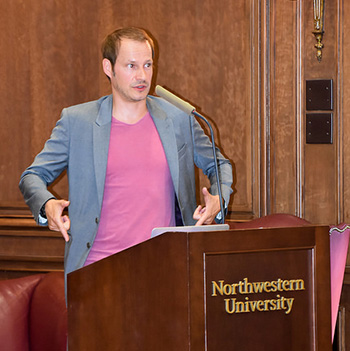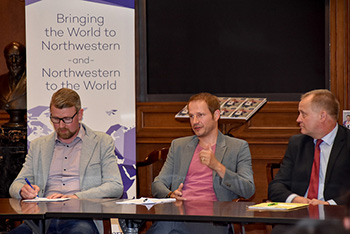German author and TV host speaks on the power of appreciation
German author and TV host speaks on the power of appreciation

German author and ZDF TV host Tim Niedernolte during his talk at Northwestern on June 4.

Daniel Schneider, Tim Niedernolte and Dr. Andreas Götze during the Q&A.
Tim Niedernolte was a successful television host at one of Germany’s most watched channels when he suddenly felt that something was missing in his life. What would be his larger contribution to society?
At a June 4 talk co-hosted by the Office of International Relations and the Department of German, and co-sponsored by the Medill School of Journalism, Media, and Integrated Marketing, Niedernolte explained how he found the answer and wrote a book to share his experience with others.
He and his co-author, Daniel Schneider, spoke with Germany’s Deputy Consul General Andreas Götze on how this existential question led them to write “Wunderwaffe Wertschätzung,” about the power of appreciation in efforts both grand and small.
In the book, Niedernolte and Schneider delve into their own experiences as journalists, authors and appreciators of everyday life, and shared the stories of German icons—chef Christian Rach, TV journalist Dunja Hayali, and more—to understand how appreciation can transform difficult situations.
The concept of Wertschätzung, the German term for appreciation and valuing life, seems to ring true to readers. Since February, when “Wunderwaffe Wertschätzung” was first published, the co-authors have come out with a second edition, with a third on the way, and have spoken on the subject on TV and radio shows, at events and in bookstores across Germany, and now, in the United States.
“The more time I spend on this subject, the more I believe that a lifestyle of appreciation can change lives and can change society,” Niedernolte told attendees, who were a mix of journalism and German studies students and professors, and members of the German American community in the Chicagoland area.
Appreciation in the face of pressure
As an example, Niedernolte told the story of Christian Rach, one of the most popular television chefs in Germany and Europe, whom he interviewed for his book. Early in Rach’s career, the Thai Industrial Association invited him to cook for a prestigious event for members of the royal family, business leaders and Thai military personnel. But the gig was offered on very short notice—Rach only had two days to create an elaborate feast.
Instead of stressing out and ordering around kitchen staff, Rach took the time to get to know his team better. He sat and talked with them and tasted the foods they had brought from home. The next day, the staff “moved heaven and earth” for Rach, Niedernolte said. They prepared the food together efficiently and harmoniously, pulling off a successful dinner reception.
“In the face of pressure and challenge, it pays off not to blindly push ahead, or to just throw in the towel,” Niedernolte said. “Appreciate and value the people around you and let them be part of the solution.”
In fact, the process of writing the book itself was deeply rooted in appreciation. In 2017, soon after Niedernolte began feeling a need for change, he and four friends, including Schneider, met for two days in Linz, Austria to discuss their passions, what they believed was missing in the world and what they could do to make the world a better place.
Finally, they settled on the simple, life-changing concept of Wertschätzung. Niedernolte and Schneider believe that a little appreciation can go a long way, both on a grand scale in business, politics and society, and across borders, and on a small scale in daily interactions with family, friends and strangers.
The co-authors, who also have had rich careers in journalism, relate appreciation to the practice of reporting. In an era of unprecedented “fake news” and anonymized hatred on social media, Niedernolte cites constructive journalism as an appreciation-based way of transforming the industry.
“Constructive journalism not only provides information about bad news, but examines possible solutions to them,” Niedernolte said. “Rather than merely uncovering, it helps to find answers.”
Though certain stylistic regularities and journalistic rules must be followed, Niedernolte said that journalists must “be brave and raise their hands and point out things that the industry does wrong.”
>Maintaining relations across borders and at work
The trick, Andreas Götze said in the conversation following the talk, is to see the humanity in others. Though his work as a diplomat prioritizes protocol to maintain foreign relationships, such decorum does not preclude the real human connection necessary for progress to be made.
“The questions of who steps first out of the plane, or how long to wait before offering a handshake, all have huge importance,” said Götze, who has served as part of the German Federal Foreign Office for many years. “The process of diplomacy only becomes effective if people see the humanity in each other and form true relationships.”
But it’s not just foreign relations that benefit from appreciation; as a television reporter and host, Niedernolte said he always goes around to shake his team members’ hands after a shoot, just to say thanks.
“In the TV business, you have a very big team that is responsible for filming and making sure the shoot goes well, so I want to show my appreciation,” Niedernolte said.
When asked for parting advice for people who want to start embracing Wertschätzung tomorrow, all three had powerful, but distinct recommendations:
- Daniel Schneider: “Love yourself so you can love others”
- Tim Niedernolte: “Why start tomorrow? Start today!”
- Andreas Götze: “Always try to see the human in others”